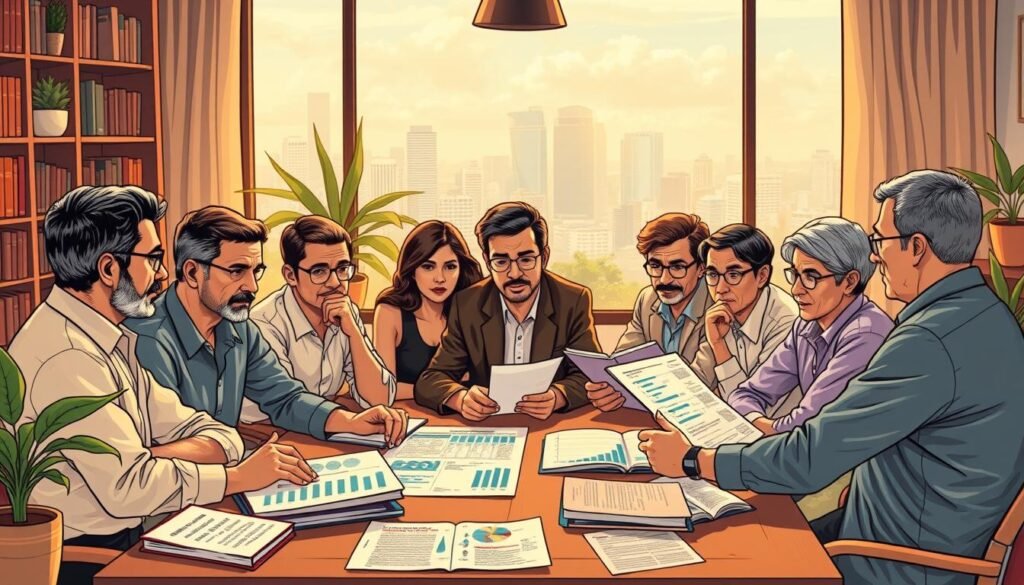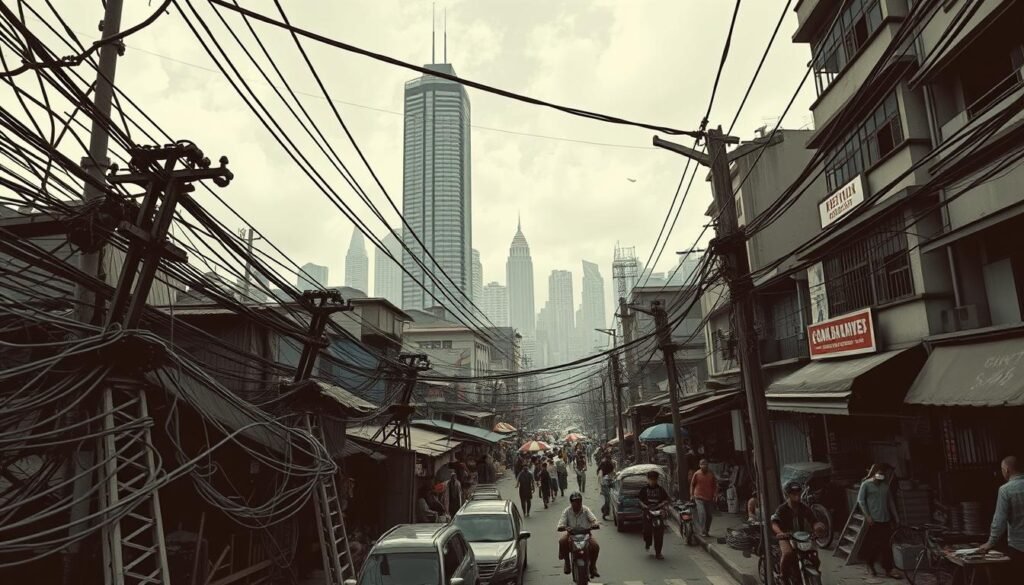Economic dependence has long shaped the political and economic discourse in the Philippines. From historical theories by thinkers like Marx to modern global contexts, the concept of dependence remains central to understanding development. In the Philippines, this dynamic plays out in unique ways, influencing policies and community structures.
The interplay between independence and dependence is complex. Theorists such as Marx and Macpherson have highlighted how economic reliance can both hinder and drive progress. In the Philippine setting, this is evident in the country’s reliance on agriculture and foreign investments. These factors create a delicate balance between growth and vulnerability.
Cultural and social dimensions further complicate the issue. The Philippines’ rich history and diverse communities add layers to how dependence is experienced and addressed. This article will explore these nuances, comparing economic policies and anthropological insights to provide a comprehensive view.
Later sections will delve into specific examples, such as the role of public-private partnerships and climate-resilient projects. These initiatives aim to reduce dependence while fostering sustainable development. By understanding these dynamics, we can better navigate the challenges and opportunities ahead.
Key Takeaways
- Economic dependence significantly influences Philippine development.
- Historical and modern perspectives provide valuable insights.
- The interplay between independence and dependence is complex.
- Cultural and social factors add layers to the issue.
- Public-private partnerships are key to reducing dependence.
- Climate-resilient projects are essential for sustainable growth.
Introduction to Dependence in the Philippine Context
Understanding the layers of dependence in the Philippines requires examining its economic, social, and cultural dimensions. This concept is not just about reliance but also about how it shapes communities and policies. In the Philippines, dependence has evolved from traditional family and communal ties to modern economic relationships.

Defining Dependence: Economic, Social, and Cultural Dimensions
Dependence in the Philippines takes many forms. Economically, it is seen in the country’s reliance on agriculture and overseas remittances. Socially, it reflects the strong family bonds that provide support systems. Culturally, it is tied to traditions that emphasize community over individualism.
Historically, Western thinkers like Hobbes and Locke framed dependence as a state of vulnerability. In the Philippines, however, it is often viewed as a necessity for survival. This dual nature makes dependence both a challenge and a driver of progress.
Historical Background of Dependence in the Philippines
The Philippines’ history of dependence dates back to its colonial past. From Spanish rule to American influence, external forces have shaped its economic and social structures. Over time, the country has shifted from traditional reliance to modern economic relationships.
For example, the rise of overseas Filipino workers (OFWs) has created a new form of dependence. Remittances from OFWs now account for a significant portion of the country’s GDP. This highlights the evolving nature of dependence in the Philippines.
As we explore further, we’ll see how policies and anthropological perspectives address these dynamics. Understanding dependence is key to navigating the Philippines’ path to sustainable development.
Economic Policies and Community Structures
Welfare systems and community networks play a pivotal role in shaping economic dynamics in the Philippines. These structures influence how individuals and families navigate challenges, from poverty to employment. Understanding their impact is key to addressing economic reliance and fostering sustainable development.

Impact of Welfare Systems and Community Networks
Welfare systems in the Philippines serve as both a safety net and a potential source of reliance. Programs like conditional cash transfers aim to alleviate poverty but also raise questions about long-term independence. Studies by Young and Wilmott highlight how such systems can strengthen community ties while also creating interdependencies.
Community networks, on the other hand, provide informal support that complements formal welfare. Traditional kinship systems remain vital, offering emotional and financial assistance. However, modern urban settings often rely on broader community organizations to fill gaps left by limited government resources.
Ethnographic research reveals that these networks can either support or undermine free-market ideals. In rural areas, communal practices often prioritize collective well-being over individual profit. In contrast, urban communities may adopt more competitive behaviors, reflecting global economic trends.
- Welfare systems can mitigate economic challenges but may also foster reliance.
- Community networks provide essential support, blending traditional and modern practices.
- Ethnographic studies show how these structures influence economic behavior and development.
Debates continue on whether welfare encourages independence or perpetuates reliance. Some argue that well-designed programs empower individuals, while others believe they create cycles of dependency. These discussions are crucial for shaping policies that balance support with self-sufficiency.
In the Philippines, the interplay between welfare systems and community networks highlights the complexity of economic reliance. By understanding these dynamics, policymakers can create strategies that promote resilience and sustainable growth.
Anthropological Perspectives on Dependence
Anthropological studies reveal that dependence is not a universal concept but varies across cultures. While Western societies often view it as a weakness, many non-Western contexts see it as a vital social bond. This section explores how cultural evaluations and theoretical insights shape our understanding of dependence.

Cultural Evaluations and Interdependencies
In Melanesia, gift exchange systems like the kula ring highlight the importance of interdependence. These practices foster social cohesion and mutual support. Similarly, patron-client relationships in the Philippines demonstrate how dependence can strengthen community ties.
Contrast this with modern neoliberal ideologies, which prioritize individualism. Traditional systems often emphasize collective well-being over personal independence. This cultural variability challenges the assumption that dependence is inherently negative.
“Dependence is not a flaw but a fundamental aspect of human societies.”
Theoretical Insights from Marx, Macpherson, and Other Thinkers
Karl Marx argued that capitalist societies create isolated individuals, masking the inherent dependence on social structures. C.B. Macpherson’s concept of possessive individualism critiques the idea that independence is always preferable. Both thinkers highlight the value of interdependency.
These theories contrast sharply with modern economic ideologies. They suggest that dependence, when understood culturally, can be a source of strength rather than a problem.
| Cultural Context | View on Dependence | Example |
|---|---|---|
| Melanesia | Positive, fosters social bonds | Kula ring exchange |
| Philippines | Necessary for community support | Patron-client systems |
| Western Societies | Often viewed negatively | Neoliberal individualism |
Anthropologists challenge the valorization of independence, showing that dependence can be beneficial. By understanding these cultural and theoretical perspectives, we can better address the complexities of dependence in global contexts.
Dependence: A Multifaceted Concept in Philippine Development
The Philippines’ economic landscape is shaped by a delicate balance between reliance and self-sufficiency. This dynamic is evident in the country’s historical and modern contexts, where state-provided support and individual wage labor often clash. Understanding this interplay is key to addressing the challenges of development.

Economic Dependence versus Independence: A Comparative Analysis
Economic models promoting complete independence often clash with those recognizing interdependence. In the Philippines, communal strength is a cornerstone of local systems. For example, rural communities rely on shared resources and mutual aid, while urban areas depend on state welfare programs.
Historical texts highlight how colonial rule fostered economic reliance. Modern case studies, such as the rise of overseas Filipino workers (OFWs), show how dependence has evolved. Remittances from OFWs now account for a significant portion of the GDP, blending individual autonomy with communal support.
“Economic independence is not about eliminating reliance but about creating sustainable systems of support.”
Policy shifts have also impacted local perceptions of independence. For instance, conditional cash transfer programs aim to reduce poverty but raise questions about long-term self-reliance. These initiatives highlight the ethical dilemmas of welfare dependence.
- Communal systems in rural areas emphasize shared resources.
- State welfare programs in urban settings provide essential support.
- OFW remittances illustrate the blend of individual and communal reliance.
The Philippines’ experience shows that dependence is not inherently negative. When balanced with autonomy, it can foster resilience and sustainable growth. By addressing these complexities, the country can navigate its path toward development more effectively.
Substance Use, Health, and the Dynamics of Addiction
Substance use and its impact on health reveal complex dynamics between dependence and addiction. While these terms are often used interchangeably, they represent distinct concepts with unique implications for treatment and recovery. Understanding these differences is crucial for addressing the challenges of substance-related health issues.

Distinguishing Dependence from Addiction
Dependence refers to the body’s physical reliance on a substance, often marked by tolerance and withdrawal symptoms. Tolerance occurs when a person needs increasing amounts of a drug to achieve the same effect. Withdrawal involves physical and psychological symptoms when the substance is reduced or stopped.
In contrast, addiction is a behavioral disorder characterized by compulsive substance use despite harmful consequences. It involves changes in brain function, particularly in areas related to reward and self-control. While dependence can occur without addiction, the two often coexist, complicating treatment efforts.
“Addiction is not just about physical reliance but also about the loss of control over substance use.”
Treatment Approaches and Behavioral Responses
Effective treatment for substance use disorders requires addressing both physical and psychological aspects. Detoxification programs help manage withdrawal symptoms, while behavioral therapies aim to modify harmful patterns of use. Cognitive-behavioral therapy (CBT) and motivational interviewing are commonly used to enhance self-control and reduce relapse risks.
Studies show that therapeutic interventions can restore self-control and reduce vulnerability to addiction. For example, support groups like Alcoholics Anonymous provide ongoing encouragement and accountability, which are vital for long-term recovery.
- Detoxification addresses physical dependence and withdrawal symptoms.
- Behavioral therapy focuses on changing harmful habits and thought patterns.
- Support groups offer community and accountability for sustained recovery.
Understanding the progression from substance abuse to a full-blown disorder is essential for effective intervention. By addressing both dependence and addiction, treatment programs can help individuals regain control and improve their quality of life.
Interdisciplinary Debates and Future Perspectives on Dependence
Interdisciplinary debates on dependence reveal diverse perspectives shaping global and local policies. Scholars from anthropology, sociology, and public policy have examined how dependence influences societal structures and individual behaviors. These discussions are critical for understanding its role in development and health.

Global interpretations often emphasize independence as a goal, while local contexts, like the Philippines, view dependence as a necessary social bond. This contrast highlights the need for culturally sensitive policy-making. For example, international welfare models may not align with the communal systems prevalent in rural Filipino communities.
Global Versus Local Interpretations in Policy Making
Policy makers face the challenge of balancing global trends with local realities. International frameworks often prioritize individual autonomy, but local systems, such as the kula ring in Melanesia or patron-client relationships in the Philippines, emphasize interdependence. These cultural differences shape how dependence is addressed in policy design.
“Effective policies must recognize the cultural and economic contexts in which dependence exists.”
In the Philippines, programs like conditional cash transfers aim to reduce poverty but raise questions about long-term self-reliance. These initiatives reflect the ethical dilemmas of welfare dependence, where support systems can both empower and create reliance.
- Global trends often clash with local practices, requiring adaptive policy solutions.
- Cultural interpretations of dependence influence how communities address economic and social challenges.
- Emerging research highlights the need for interdisciplinary approaches to understand dependence fully.
Future directions in research emphasize the integration of diverse disciplines to address complex societal issues. Studies on interdisciplinary theory suggest that collaborative frameworks are essential for sustainable development. By contextualizing global theories, the Philippines can better navigate its unique challenges.
Challenges and Controversies in Addressing Dependence
The concept of dependence has sparked intense debates across political, social, and academic spheres. While it is often framed as a personal or societal flaw, critiques from theorists like Fraser and Gordon reveal its use as a political tool. These controversies highlight the moral evaluations attached to dependence and its performative effects in governance.

Critiques from Political and Social Theories
Political theorists argue that labeling individuals or communities as dependent can reinforce power imbalances. Fraser and Gordon critique the term’s historical roots, noting its association with moral failings. They argue that such labels often justify restrictive welfare policies, perpetuating cycles of poverty.
In the Philippines, this dynamic is evident in debates over conditional cash transfers. While these programs aim to reduce poverty, critics argue they create reliance on state support. This tension between aid and autonomy reflects broader global challenges in addressing dependence.
“Labeling dependence as a moral failing ignores the structural inequalities that create it.”
Evolving Views on Dependency in Public Discourse
Public discourse on dependency has shifted over time. Early narratives framed it as a personal failing, but modern perspectives emphasize systemic factors. For example, the rise of addiction as a public health issue has reshaped how dependence is understood and treated.
In the Philippines, the integration of tobacco dependence treatment into addiction programs reflects this shift. However, challenges like staff attitudes and resource gaps persist, highlighting the need for comprehensive approaches.
- Historical narratives often blamed individuals for dependence.
- Modern perspectives focus on systemic and structural causes.
- Public health initiatives aim to address dependence as a treatable condition.
| Perspective | Critique | Example |
|---|---|---|
| Political Theory | Labels reinforce power imbalances | Welfare policies in the Philippines |
| Social Theory | Moral evaluations ignore structural causes | Critiques by Fraser and Gordon |
| Public Health | Dependence as a treatable condition | Integration of tobacco treatment |
These evolving views reflect broader societal changes. As research continues to challenge established theories, the need for interdisciplinary approaches becomes clear. By reevaluating how dependence is framed, policymakers can create more equitable and effective solutions.
Conclusion
Throughout this article, we’ve explored the multifaceted nature of dependence in the Philippines, examining its economic, cultural, and health dimensions. From historical roots to modern challenges, the concept remains central to understanding the country’s development. The nuanced distinctions between dependence and addiction highlight the need for tailored approaches in policy and treatment.
Anthropological and economic perspectives reveal that dependence is not inherently negative. In many cases, it fosters community resilience and support. However, challenges like substance use and economic reliance require careful navigation. Effective treatment programs and sustainable policies are essential to address these issues.
As the Philippines continues to evolve, interdisciplinary dialogue will be crucial. By integrating insights from various fields, the country can better address the complexities of dependence. This approach will pave the way for a more resilient and self-sufficient future.
For further reading on sustainable economic strategies, visit this resource.
FAQ
What is the historical background of dependence in the Philippines?
The Philippines has a long history of economic, social, and cultural dependence, shaped by colonization, trade relationships, and global influences. This has impacted its development and community structures over time.
How do economic policies affect community structures in the Philippines?
Economic policies, including welfare systems and community networks, play a significant role in shaping the Philippines’ development. They influence resource distribution, social support, and local economies.
What are the cultural evaluations of dependence in the Philippines?
Cultural evaluations highlight the interdependencies within Filipino society, emphasizing family ties, community support, and shared responsibilities as key aspects of their social fabric.
How do theoretical insights from Marx and Macpherson apply to dependence?
Thinkers like Marx and Macpherson provide frameworks for understanding economic and social dependence, focusing on power dynamics, class struggles, and the role of capitalism in shaping societal structures.
What is the difference between economic dependence and independence?
Economic dependence refers to reliance on external resources or systems, while independence emphasizes self-sufficiency and local control over economic activities and policies.
How is dependence distinguished from addiction in health contexts?
Dependence often refers to a physical reliance on substances, while addiction includes behavioral and psychological aspects. Treatment approaches address both the physical and mental health dimensions.
What are the global versus local interpretations of dependence in policy making?
Global interpretations focus on international trade and aid, while local perspectives emphasize community-based solutions and cultural contexts in addressing dependence.
What critiques arise from political and social theories on dependence?
Critiques often highlight the imbalance of power, exploitation, and the need for equitable policies to address dependency issues in both economic and social spheres.
How are evolving views on dependency shaping public discourse?
Evolving views emphasize the need for sustainable development, local empowerment, and inclusive policies to reduce dependency and promote self-reliance in the Philippines.
Source Links
- Overview
- Department of Economic and Social Affairs
- The Philippines’ Dangerous Dependence on the Exploitation of its People – New Naratif
- Remittances and Household Behavior in the Philippines (No. 188)
- Economic structures, institutions and economic performance – Journal of Economic Structures
- Britannica Money
- Dependence
- OII | Digital Harm and Addiction: an Anthropological View
- The Manila Declaration on the Drug Problem in the Philippines
- Poverty-Philippines-Causes-Constraints-Opportunities.pdf
- Drug Dependence: Symptoms, Treatment, and Outlook
- THE NEUROBIOLOGY OF SUBSTANCE USE, MISUSE, AND ADDICTION – Facing Addiction in America
- Disentangling the different layers of interdisciplinarity
- Barriers to Use of Pharmacotherapy for Addiction Disorders and How to Overcome Them
- Dependency Theory: A Useful Tool for Analyzing Global Inequalities Today?
- Psychoactive Drugs: 7. Conclusions

